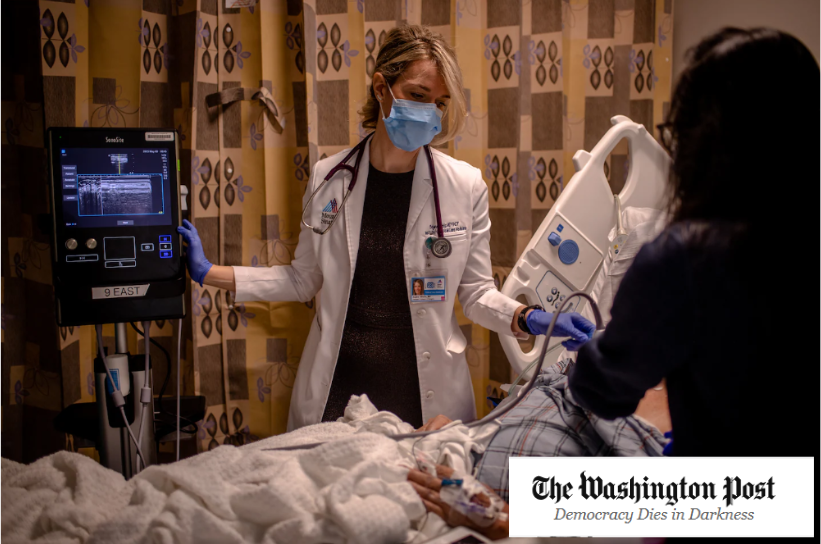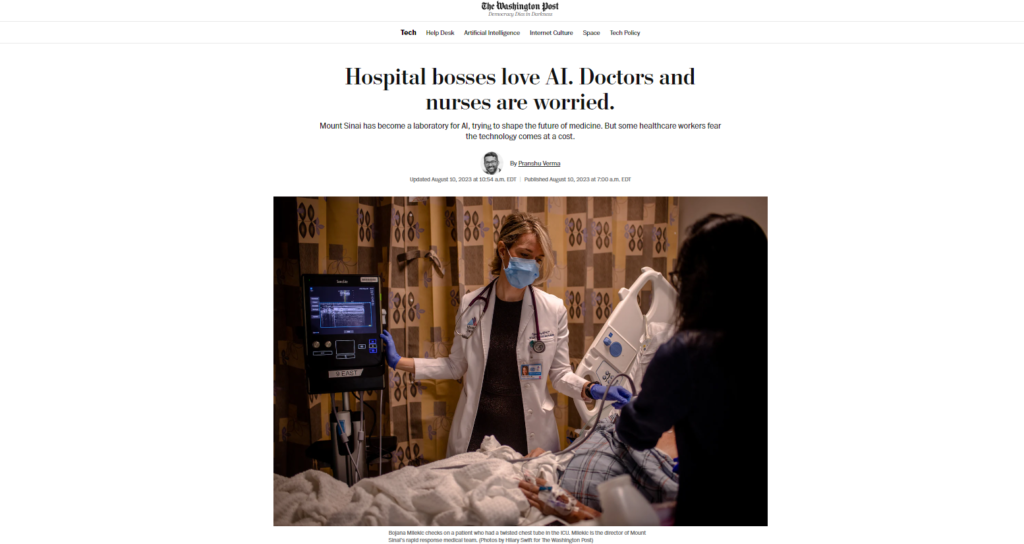the health strategist
research institute for health strategy
and digital health
Joaquim Cardoso MSc.
Chief Research and Strategy Officer (CRSO),
Chief Editor and Senior Advisor
August 21, 2023
ONE PAGE SUMMARY
What is the message?
According to a Washington Post article, Mount Sinai Hospital is at the forefront of integrating artificial intelligence (AI) into healthcare, envisioning a future where AI technologies enhance medical diagnostics and patient care.
While AI shows promise in improving efficiency and accuracy, concerns voiced by doctors and nurses emphasize that AI’s limitations, potential biases, and data security risks must be carefully considered.
As the medical community grapples with the balance between technological advancement and preserving human-centered care, the transformative potential of AI in healthcare remains accompanied by cautious skepticism.
Key takeaways:
- What is the focus of Mount Sinai Hospital’s AI integration in healthcare?
Mount Sinai Hospital is investing heavily in AI technology and research to transform healthcare. The hospital aims to use AI to enhance patient care, improve diagnoses, and streamline various medical processes.
- How does AI impact patient assessment and prioritization?
AI generates scores that assist doctors like Bojana Milekic in assessing patients’ conditions and identifying those who might be at higher risk. This AI-generated scoring system helps doctors prioritize patients based on their potential severity.
- What are some notable successes of AI in healthcare, as mentioned in the article?
Recent scientific studies have shown that AI can outperform human radiologists in detecting breast cancer from mammograms. Additionally, generative AI is being adapted to clinical settings for tasks like transcription and creating patient summaries.
- What concerns do healthcare workers, particularly doctors and nurses, have about AI integration?
Healthcare practitioners worry about AI’s potential to make incorrect diagnoses, expose sensitive patient information, and lead to staff reductions under the guise of innovation. They emphasize that AI cannot replicate the personalized care and compassion provided by human doctors and nurses.
- How does Mount Sinai Hospital view its role in AI advancement?
Mount Sinai sees itself as a research hospital that plays a crucial role in testing and refining AI technology. The hospital has invested significant resources to develop in-house AI tools and research facilities, allowing for physician input and practical refinement.
- What challenges does AI face in healthcare, according to the article?
Challenges include concerns about biased diagnoses, inaccuracies, and the erosion of trust in medical professionals due to premature adoption of unproven technology. Some healthcare professionals worry that AI may not be as effective as advertised.
- What is the ultimate goal of AI integration in healthcare, according to David L. Reich, the president of Mount Sinai Hospital?
David L. Reich’s goal is to ensure that AI technology doesn’t replace healthcare workers but rather enhances patient-doctor interactions. The aim is to achieve the right pairing of doctors with patients at the right time.
- What perspective do patients have regarding AI in healthcare?
Patients like Rebecca Brown emphasize the unique value of the human touch in healthcare. They believe there are aspects of care that technology can never replicate, underscoring the enduring importance of compassionate, human-centered care.

Summary:
Mount Sinai Hospital has emerged as a pioneering institution in the integration of artificial intelligence (AI) in healthcare, with a focus on reshaping the future of medicine. Despite the potential benefits AI offers, there is growing apprehension among healthcare practitioners, particularly doctors and nurses, about the consequences of heavily relying on AI in patient care.
Bojana Milekic, a critical care doctor at Mount Sinai Hospital, exemplifies the transformative potential of AI in healthcare. She utilizes an AI-generated score to assess patients’ conditions and prioritize those who might be at risk. In one instance, the AI flagged a lung patient with a high score, leading Milekic to identify and address a critical issue with a chest tube, ultimately saving the patient’s life.
Mount Sinai and other elite hospitals are heavily investing in AI technology and research, buoyed by scientific evidence that suggests AI can outperform human counterparts in tasks like detecting breast cancer from mammograms. Generative AI, capable of generating text, sounds, and more, is also being adapted to clinical settings for tasks like transcription and patient summaries.
However, this AI advancement has caused a rift among healthcare workers. Concerns range from erroneous diagnoses to compromised patient data and fears that AI adoption might provide an excuse for hospitals to reduce staff for the sake of innovation and efficiency. While AI’s potential is acknowledged, healthcare professionals stress that it cannot replace the intricate, compassionate work performed by human doctors and nurses.
The history of AI in healthcare traces back to the 1970s, evolving from rudimentary systems diagnosing infections to modern applications that predict patient ailments. The surge in computing power has empowered AI to predict individual patient outcomes. Yet, skepticism persists due to potential biases, inaccuracies, and fears of diminishing trust in medical professionals.
Mount Sinai’s Dean for AI, Thomas J. Fuchs, emphasizes the importance of research hospitals serving as AI testing grounds. Mount Sinai has invested heavily in developing in-house AI tools and research facilities to enhance physician input and refine AI technology.
Mount Sinai’s President, David L. Reich, maintains that the ultimate goal is to facilitate the right patient-doctor pairing at the right time, rather than replacing human healthcare providers.
Nevertheless, a lack of empirical evidence supporting AI’s actual improvement of patient care, combined with concerns about potential biases and inaccuracies, has fueled skepticism among medical professionals.
While AI presents opportunities for efficiency and accuracy, the human touch remains irreplaceable in healthcare. As healthcare systems continue their AI integration, they must navigate the balance between technological advancement and preserving the essential aspects of human-centered care.
DEEP DIVE

This summary was written based on the article “Hospital bosses love AI. Doctors and nurses are worried” published by The Washington Post. To read the full article, access: https://www.washingtonpost.com/technology/2023/08/10/ai-chatbots-hospital-technology.
Mentioned names
Pranshu Verma – reporter on The Washington Post’s technology team
David L. Reich – Mount Sinai’s President
Robbie Freeman – Mount Sinai’s vice president of digital experience
Thomas J. Fuchs – Mount Sinai’s Dean for AI
Vijay Pande – general partner at venture capital firm Andreessen Horowitz
Michelle Mahon – assistant director of nursing practice at the National Nurses United union
Bojana Milekic – critical care doctor at Mount Sinai Hospital












